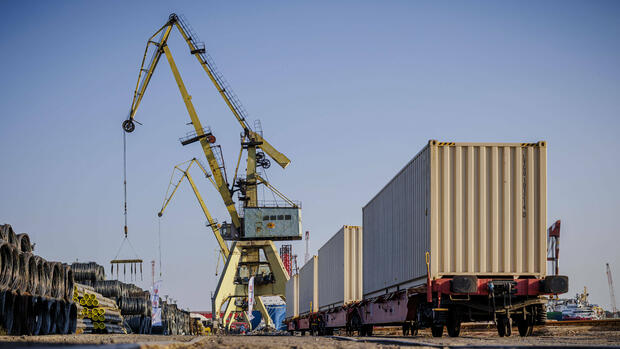The abundance of Ukrainian grain depresses prices in several EU countries.
(Photo: IMAGO/photothek)
Brussels The EU has been helping Ukraine to export its grain for the past year with a tremendous effort. Since shipping via the Black Sea ports does not work to the same extent as before the war, the Europeans invest in railroad tracks, trains and barges in order to save as much of the precious feed and food as possible.
From a Brussels perspective, these investments are a single success story. Before the war, 5,800 tons of corn came to Poland from Ukraine every year. In 2022 it was 1.84 million tons – more than 300 times that. Imports of wheat rose from 2,800 to 500,000 tons.
From the perspective of Polish farmers, however, the numbers are a threat to their livelihoods. The market is flooded with Ukrainian grain, causing prices to fall. Since the EU lifted all import tariffs last year, Ukraine has enjoyed unrestricted access to the internal market.
This week, Poland, Hungary and Slovakia announced an import ban on Ukrainian grain as an emergency measure to deal with the oversupply. Romania and Bulgaria also demanded a solution from the EU.
The fact that the Eastern European countries went it alone is a direct challenge for the EU Commission, since trade policy falls under the responsibility of Brussels. Commission President Ursula von der Leyen (CDU) calls for an immediate end to the grain blockade and wants to accommodate the states in return.
In a letter to the five governments, she announced that the EU would use an emergency mechanism to restrict imports again. She also wants to help affected farmers financially. Von der Leyen promised an additional 100 million euros. The Commission also wants to ensure that the grain is transported from the Eastern European countries.
Commission wants to organize grain transport
So far, the grain has come out of Ukraine, but onward transport to European seaports is complicated and expensive. Trucks, trains, and even barges don’t have the same capacity as the ocean liners that normally ship Ukraine’s grain to Africa and Latin America. On the European route, costs rise to 40 percent of the final price, says a senior Commission official. Normally it is no more than ten percent.
Grain exports to Europe are vital for the country at war.
(Photo: dpa)
Spain, which had a poor harvest last year, even sent a state-sponsored train to the Ukrainian border to test whether a direct connection would be worthwhile. The experiment was not repeated because of the exorbitant cost.
In Brussels it is now being discussed that the EU will buy up the Ukrainian grain and deliver it to the buyer countries. “The grain must arrive where it is needed, not where it leads to surpluses and dumping prices,” says Romanian MEP Siegfried Muresan. The EU must ensure onward transport from neighboring Ukrainian countries.
Grain exports to the EU bring 26 billion euros
Grain export to the EU is vital for Ukraine. In the past year alone, the companies would have taken 26 billion euros, said a Commission official – and thus significantly more than the 17 billion euros that came into the country through economic aid from the EU.
>> Read here: Moscow threatens to end the grain agreement
A collapse of this revenue would hit the country hard – and increase Russia’s threat potential. Moscow regularly threatens not to renew the agreement on grain exports across the Black Sea. It currently expires in mid-May.
That is why negotiations are now under way for a European solution. A talk by Commission Vice President Valdis Dombrovskis with the five states on Wednesday did not bring any breakthrough. David Kleimann from the Bruegel Institute in Brussels says: “There is a lot of pressure in the boiler.” Von der Leyen announced “relatively comprehensive measures”, but the governments involved are now trying to get as much out of it as possible for their farmers. Elections are due in Poland in the fall. However, he expects the dispute to be resolved in the coming days.
Grain dispute is a reality check for advocates of accession
The decisive question will be how the further transport of the grain can be organized – and how expensive this will be for the EU. “The EU countries have decided on joint alternative trade routes for exports from Ukraine,” says Kleimann. “It is understandable that the neighbors do not want to bear the burden alone. The EU should therefore take responsibility for the consequences.”
The dispute over cheap grain is also a reality check for supporters of Ukraine’s rapid accession to the EU. It gives a foretaste of the distribution conflicts to be expected when the agricultural nation with its huge farms is in the internal market. Ukraine is one of the world’s largest producers of wheat, corn and barley.
For MP Muresan it is clear: “Ukraine’s rapprochement with the EU will take time. The Ukrainian economy needs to be completely overhauled and adapted to Western European standards before accession can take place.”
More: Eastern Europe’s farmers are rebelling against Ukrainian grain imports
